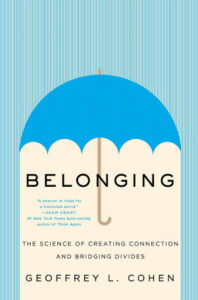
 Lead From the Heart
Lead From the Heart Geoffrey Cohen: The Science Of Creating Connection And Bridging Divides
Belonging: A Core Need
- Belonging, the opposite of loneliness, is a fundamental human need.
- Its absence can activate inflammation genes, increasing chronic illness risks.
Why We Neglect Connection
- Despite needing social connection, many factors hinder its pursuit.
- Societal changes, flawed happiness theories, and prioritizing status over connection contribute.
Building Workplace Friendships
- Foster workplace connections for better collaboration and innovation.
- Even small connections boost motivation and performance.










































 “If we have no peace, it is because we have forgotten that we belong to each other.”
“If we have no peace, it is because we have forgotten that we belong to each other.”
~ Mother Teresa.
Social belonging is a fundamental human need, hardwired into our DNA. And yet, 40% of people say that they feel isolated at work, and the result has been lower organizational commitment and engagement. I suppose we should throw “quiet quitting” in there too — a sign workers today feel less connected to their colleagues and unconvinced that they matter much to their organization, team or manager.
On top of that, we’re living in rather polarized times. Whether it’s politics, social issues, race or gender, we’re now massively divided. Even worse, as a society, we’ve grown incredibly intolerant of people who don’t think and believe what we do. To punctuate that point, 40% of people in each of the two primary political parties in the US say that supporters of their opposing party are “downright evil.”
If there was ever a problem in the world needing leadership, it’s surely this one. It’s simply unsustainable for us to cohabitate this planet without having greater empathy, compassion, connection, patience and tolerance for people who are unlike us.
So, what if there were a set of science-backed techniques for navigating life that could help us overcome our differences and rebuild lasting connections across all of these divides? What if there were a useful set of takeaways for managers and educators of all stripes to create connection now that it’s become critically needed?
Stanford University professor Geoffrey Cohen is the author of the new book, “Belonging.” His work demonstrates that there really is a way back toward having a civil and cooperative society – one where people of all stripes feel they belong — and provides concrete solutions for improving daily life at work, in school, in our homes, and in our communities.
Cohen asserts that every human being alive has a deep and essential need to belong, but most of us don’t fully appreciate that need in others. So, this episode is dedicated to understanding the methods and practices that will help us restore a common sense of belonging all tied to his groundbreaking research.
The post Geoffrey Cohen: The Science Of Creating Connection And Bridging Divides appeared first on Mark C. Crowley.
